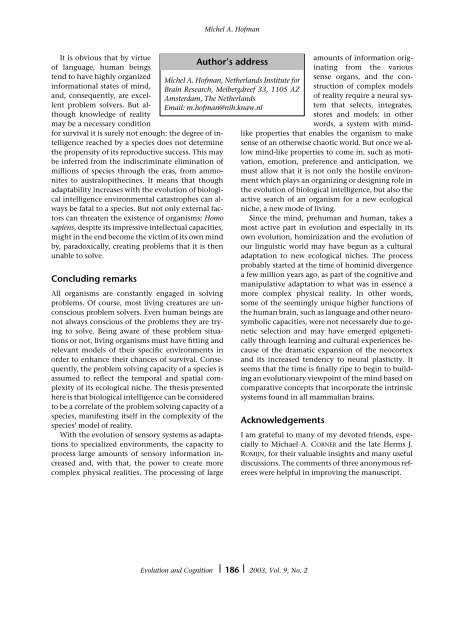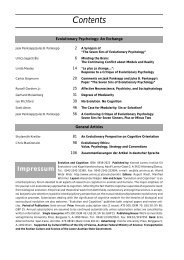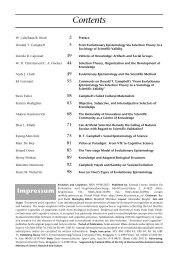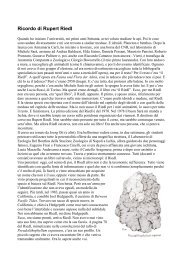Contents - Konrad Lorenz Institute
Contents - Konrad Lorenz Institute
Contents - Konrad Lorenz Institute
Create successful ePaper yourself
Turn your PDF publications into a flip-book with our unique Google optimized e-Paper software.
Michel A. Hofman<br />
It is obvious that by virtue<br />
of language, human beings<br />
tend to have highly organized<br />
informational states of mind,<br />
and, consequently, are excellent<br />
problem solvers. But although<br />
knowledge of reality<br />
may be a necessary condition<br />
for survival it is surely not enough: the degree of intelligence<br />
reached by a species does not determine<br />
the propensity of its reproductive success. This may<br />
be inferred from the indiscriminate elimination of<br />
millions of species through the eras, from ammonites<br />
to australopithecines. It means that though<br />
adaptability increases with the evolution of biological<br />
intelligence environmental catastrophes can always<br />
be fatal to a species. But not only external factors<br />
can threaten the existence of organisms; Homo<br />
sapiens, despite its impressive intellectual capacities,<br />
might in the end become the victim of its own mind<br />
by, paradoxically, creating problems that it is then<br />
unable to solve.<br />
Concluding remarks<br />
All organisms are constantly engaged in solving<br />
problems. Of course, most living creatures are unconscious<br />
problem solvers. Even human beings are<br />
not always conscious of the problems they are trying<br />
to solve. Being aware of these problem situations<br />
or not, living organisms must have fitting and<br />
relevant models of their specific environments in<br />
order to enhance their chances of survival. Consequently,<br />
the problem solving capacity of a species is<br />
assumed to reflect the temporal and spatial complexity<br />
of its ecological niche. The thesis presented<br />
here is that biological intelligence can be considered<br />
to be a correlate of the problem solving capacity of a<br />
species, manifesting itself in the complexity of the<br />
species’ model of reality.<br />
With the evolution of sensory systems as adaptations<br />
to specialized environments, the capacity to<br />
process large amounts of sensory information increased<br />
and, with that, the power to create more<br />
complex physical realities. The processing of large<br />
Author’s address<br />
Michel A. Hofman, Netherlands <strong>Institute</strong> for<br />
Brain Research, Meibergdreef 33, 1105 AZ<br />
Amsterdam, The Netherlands<br />
Email: m.hofman@nih.knaw.nl<br />
amounts of information originating<br />
from the various<br />
sense organs, and the construction<br />
of complex models<br />
of reality require a neural system<br />
that selects, integrates,<br />
stores and models: in other<br />
words, a system with mindlike<br />
properties that enables the organism to make<br />
sense of an otherwise chaotic world. But once we allow<br />
mind-like properties to come in, such as motivation,<br />
emotion, preference and anticipation, we<br />
must allow that it is not only the hostile environment<br />
which plays an organizing or designing role in<br />
the evolution of biological intelligence, but also the<br />
active search of an organism for a new ecological<br />
niche, a new mode of living.<br />
Since the mind, prehuman and human, takes a<br />
most active part in evolution and especially in its<br />
own evolution, hominization and the evolution of<br />
our linguistic world may have begun as a cultural<br />
adaptation to new ecological niches. The process<br />
probably started at the time of hominid divergence<br />
a few million years ago, as part of the cognitive and<br />
manipulative adaptation to what was in essence a<br />
more complex physical reality. In other words,<br />
some of the seemingly unique higher functions of<br />
the human brain, such as language and other neurosymbolic<br />
capacities, were not necessarely due to genetic<br />
selection and may have emerged epigenetically<br />
through learning and cultural experiences because<br />
of the dramatic expansion of the neocortex<br />
and its increased tendency to neural plasticity. It<br />
seems that the time is finally ripe to begin to building<br />
an evolutionary viewpoint of the mind based on<br />
comparative concepts that incorporate the intrinsic<br />
systems found in all mammalian brains.<br />
Acknowledgements<br />
I am grateful to many of my devoted friends, especially<br />
to Michael A. CORNER and the late Herms J.<br />
ROMIJN, for their valuable insights and many useful<br />
discussions. The comments of three anonymous referees<br />
were helpful in improving the manuscript.<br />
Evolution and Cognition ❘ 186 ❘ 2003, Vol. 9, No. 2








